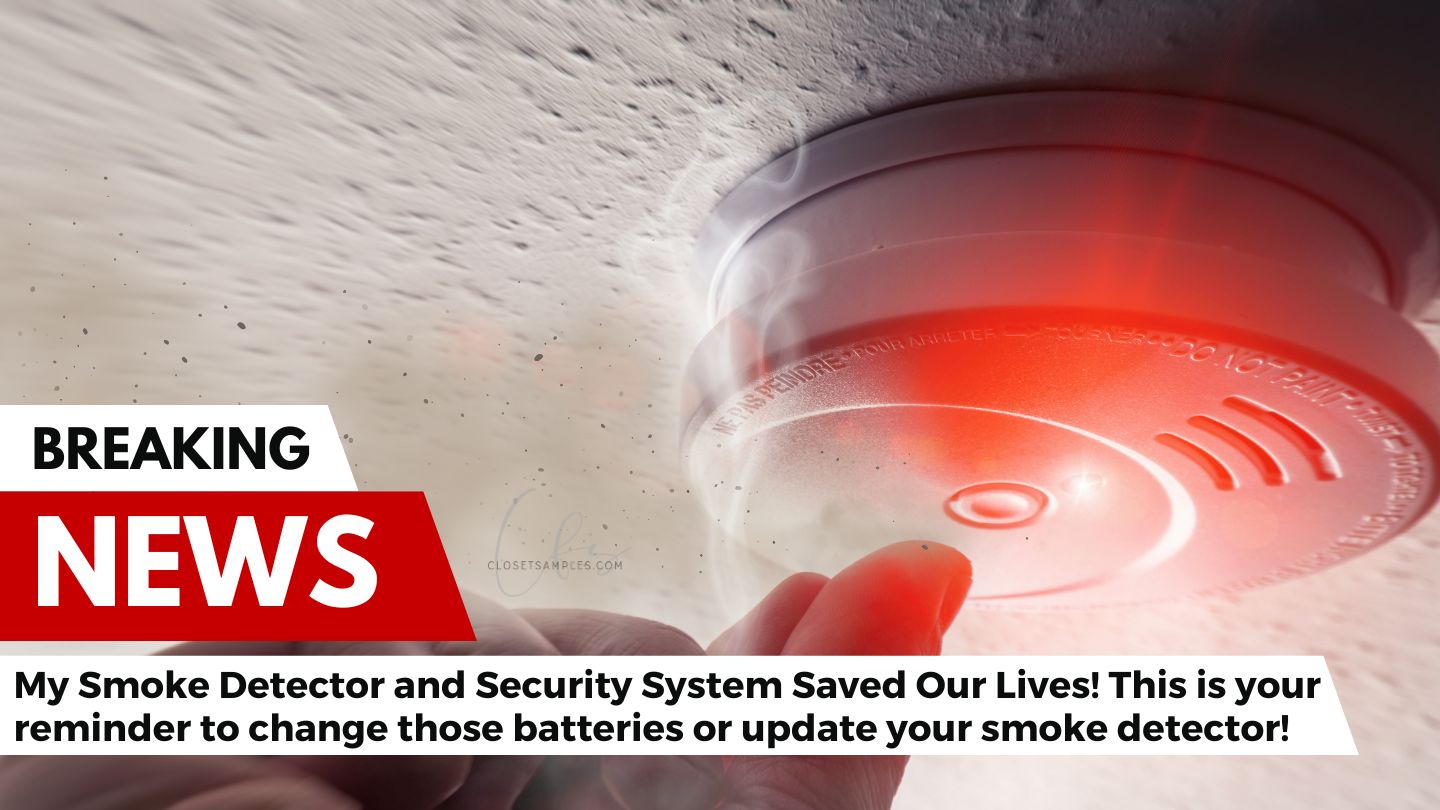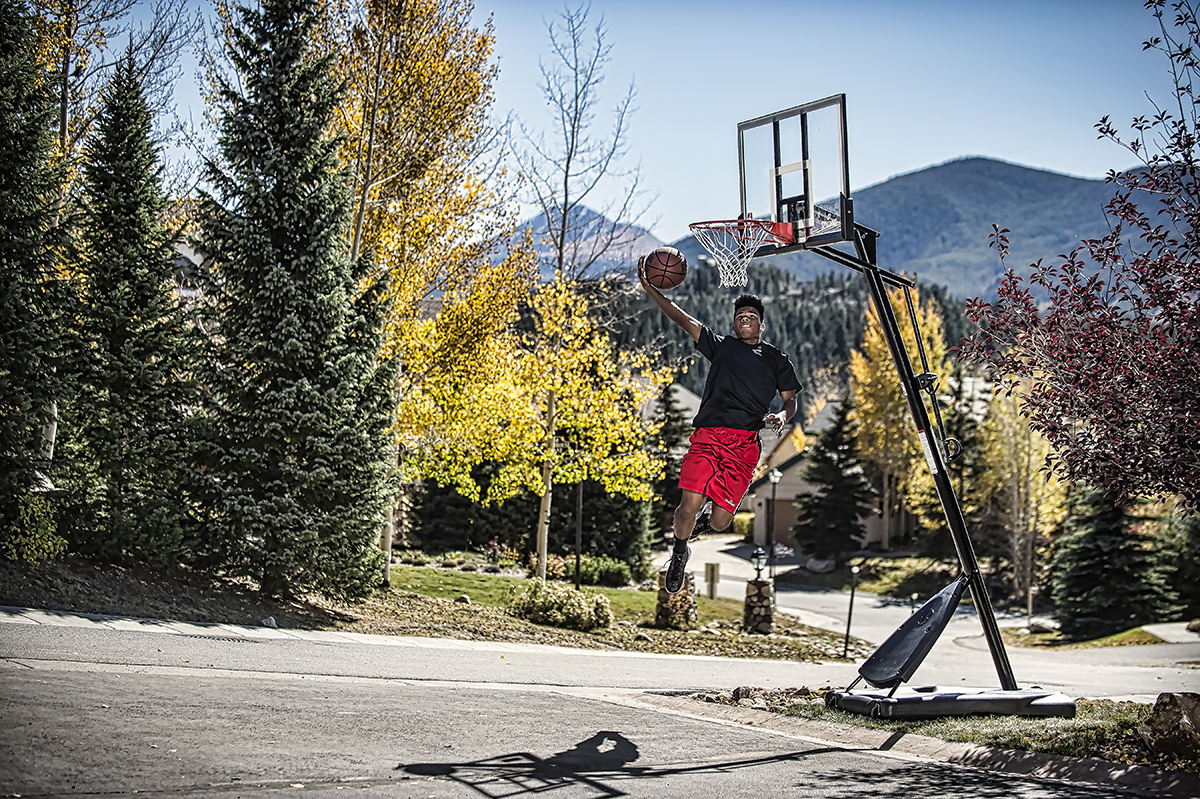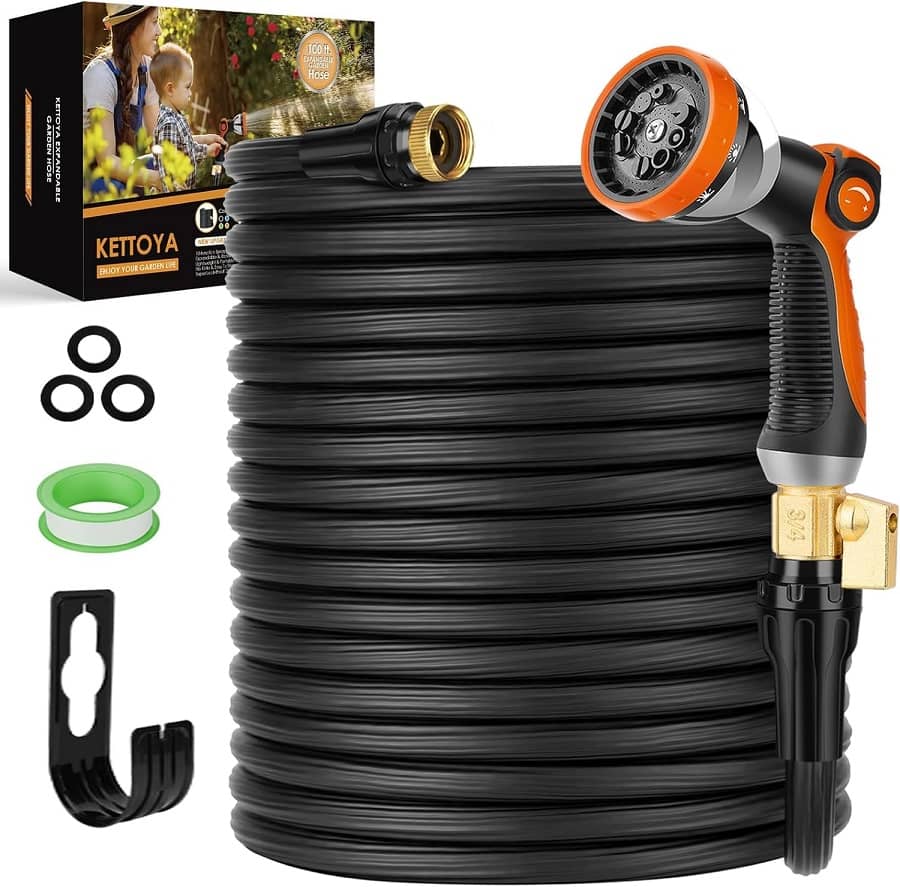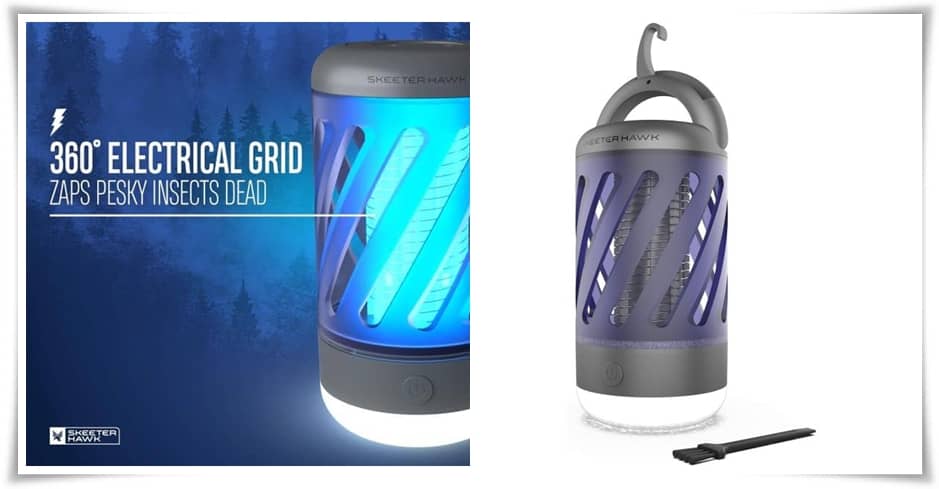This weekend our smoke alarm and security system saved our lives and this is your reminder to check those batteries and detectors!
This weekend started off as usual. We celebrated my sons birthday and we had a little get-together with my neighbors to celebrate bringing in the new year. New Years Eve all the kids wanted to do a sleepover and I couldn't be happier that we allowed them to do that.
Around 1:30am my husband I woke up from a dead sleep to the alarm going off as well as the smoke detectors. We rushed out to see our house had caught fire. Because we keep all the doors closed in our house, especially at night, we didn't notice any smoke until we got to the front room. Immediately my husband grabbed our
fire extinguisher to put it out and I went to open our side door to find the fire originated outside our home. In that moment I was just in shock and panic - not clearly thinking at all. All the rational thinking of 'what to do' was out of my mind. I have planned for hurricane evacuations and in the event we need to get to safety for a tornado, but never anything for a fire other than to get out. However, having all of the pets we do I really started to seriously panic.
In about a minute, if that long, our house went from a little smokey to pure smoke. You could not see two feet in front of you. My eyes were burning and I could feel it affecting me. All of that was within a minutes time when I only had a chance to grab my car keys and only one of the 14 cats. My husband was able to grab the dog. Remember, I can't see to get to any carriers and there was no time for that at all. I was only trying to get whoever I could and I was going to just put them in my car and figure it out later.
Fear and panic being sinking in because at that point there was nothing I could do. There was too much smoke to see. We had both doors open and during this time our security system called to validate the alarm since we didn't disarm it. Being in a state of shock and panic calling 911 didn't even sink in. And if not for our
Vivint home security system, I don't even want to think about where we would be. So they got the fire department dispatched and stayed on the line with me until they arrived. It seemed like it took forever, but when I went back and checked our indoor cameras, it was only a matter of minutes. And thanks to Vivint getting them there, everyone was okay. Scared, shakin' up, but alive and what appears unharmed.
I'm generally a light sleeper and I didn't wake up right away for whatever reason. I had left my phone on with the sound up because of children were at a sleep over and I didn't wake up to my daughter trying to call me when they saw the house had caught fire. I woke up because of when my security systems glass breaking detection heard the window bust from the heat it set off the panic alarm. This went off BEFORE the smoke detectors. Not by much time, but seconds matter in an emergency like this. And I guess I truly didn't realize just how short a minute is when you're in a panic like this.
I shared this story with y'all because there are so many 'what if' factors that could have changed this outcome. Thankfully everyone is okay. Every animal is ok - including the rats my kids got me for Mother's Day last year who have their enclosure in the front room - the place where all the smoke was at. The bottom line I am trying to get at - check your
smoke detectors! If you are hearing yours beep - don't put off changing the batteries. Too lazy to go to the store?
Order 9v batteries from Amazon and just have them delivered to you. There, the problem was solved. Just don't make an excuse because you never know if something will happen. I know we sure never thought it would.
Luckily, we have minimal damage all things considered. But the only thing I care about is that we are all still here. Every. Single. One.
So now we're in the clean-up process. Along with some of the damage is obviously soot and smoke. Because everything was handled quickly, I consider the cleanup minimal. A lot of work, but minimal in the aspect of what it could have been.
Should you be inclined to help with our cleaning, repairing, and replacing expenses, I can accept
donations via PayPal or via Venmo or Cashapp
@closetsamples. Please add a note, if you can, to confirm it is a donation for this cause.
So let me give y'all more explanations on a few things while you are here...
Image credit: Freepik
What is Vivint?
Vivint is a major smart home and security company operating in the United States and Canada. They're known for their integrated systems that combine home security features with automation elements, making your home not only safer but also more convenient and comfortable.
Here's a quick breakdown of Vivint:
What they do:
- Security: Vivint offers traditional security features like door and window sensors, motion detectors, and security cameras, along with 24/7 professional monitoring.
- Automation: They integrate various smart home devices like thermostats, lights, locks, and appliances, allowing you to control them remotely through their app or a central hub.
- Customization: Vivint systems are customizable, so you can choose the specific features and devices you need to create a personalized smart home experience.
Some things to know about Vivint:
- History: Founded in 1999, Vivint has grown to become a major player in the smart home industry. They were acquired by The Blackstone Group in 2012 and became a publicly traded company in 2020.
- Reputation: Vivint generally receives positive reviews for its high-quality equipment, reliable monitoring services, and user-friendly interface. However, some customers have reported issues with installation costs and long-term contracts.
- Pricing: Vivint systems typically require a professional installation and come with monthly monitoring fees. The exact cost will vary depending on the equipment and services you choose.
Overall, Vivint is a well-established and reputable company that offers a wide range of smart home and security solutions. If you're looking for a way to make your home safer, more convenient, and more energy-efficient, Vivint is definitely worth considering.
Image credit: Freepik
Essential Fire Safety Tips for Your Home
Here are some crucial fire safety tips to keep your home and loved ones safe:
Prevention:
- Install working smoke alarms on every level of your home, inside and outside bedrooms.
- Test them monthly and replace batteries annually.
- Consider interconnected alarms that all sound if one detects smoke.
Escape Plan:
- Create a fire escape plan with two exits from each room.
- Practice the plan regularly with everyone in your household, including pets.
- Choose a meeting place outside a safe distance from your home.
Cooking Safety:
Electrical Safety:
- Avoid overloading outlets and extension cords.
- Unplug appliances when not in use.
- Inspect cords for damage and replace frayed or cracked ones.
- Turn off power strips before plugging in appliances.
- Keep space heaters at least 3 feet away from flammable objects like furniture and curtains.
- Never leave them unattended and turn them off before going to sleep.
- Place them on a stable, level surface.
Smoking:
- Smoke outside and only in designated areas.
- Never smoke in bed or while drowsy.
- Use deep, wide ashtrays that rest on a stable surface.
In Case of Fire:
Get Out, Stay Out, Call 911:
- Evacuate immediately if the alarm sounds or you smell smoke.
- Don't stop to gather belongings.
- Close doors behind you to contain the fire.
- Call 911 from a safe distance outside.
Crawl Low Under Smoke:
- Smoke rises, so stay low to the ground if visibility is poor.
- Cover your mouth and nose with a cloth if possible.
Stop, Drop, and Roll:
- If your clothes catch fire, stop, drop to the ground, and roll to extinguish the flames.
- Cover your face and eyes to protect yourself from the heat.
Additional Tips:
- Keep a fire extinguisher readily accessible and know how to use it.
- Teach children about fire safety and the importance of not playing with matches or lighters.
- Conduct regular home fire drills to ensure everyone knows what to do in case of an emergency.
- Consider installing a home sprinkler system for added protection.
By following these tips and staying vigilant, you can significantly reduce the risk of fire in your home and keep your family safe. Remember, an ounce of prevention is worth a pound of cure!
Image credit: Freepik
Here are some of the best fire safety gear to keep on hand in case of fire, categorized by their function:
Early Warning:
Smoke Detectors: These are absolutely essential! Install working smoke alarms on every level of your home, inside and outside bedrooms. Test them monthly and replace batteries annually. Consider interconnected alarms that all sound if one detects smoke.
Carbon Monoxide Detectors: Carbon monoxide is odorless and colorless, so detectors are crucial to alert you to this silent danger. Place them near bedrooms and on each floor of your home.
Firefighting:
Fire Extinguisher: Choose one with the appropriate rating for your home (generally ABC for most household fires). Learn how to use it properly before an emergency.
Fire Blanket: This can smother small fires in pans or on surfaces. Keep it accessible in the kitchen and other areas with potential fire hazards.
Escape and Protection:
Escape Ladder: If you have second-story windows or limited exit options, a fire escape ladder can be a lifesaver. Choose one that's easy to deploy and strong enough to support your weight.
Fireproof Gloves: These protect your hands while closing doors or opening windows during escape.
Respirator Masks: Smoke inhalation can be dangerous, so having masks on hand can help you breathe safely during evacuation.
Additional Gear:
Flashlight: Power outages often accompany fires, so having a reliable flashlight is essential for navigating in the dark.
First-Aid Kit: Be prepared to treat minor burns or injuries sustained during escape.
Remember:
- Practice your escape plan regularly with everyone in your household, including pets.
- Keep all equipment readily accessible and in working order.
- Educate yourself and your family about fire safety tips and prevention methods.
By having the right gear and knowledge, you can significantly increase your chances of staying safe in case of a fire.
Bonus: Keep important documents and valuables in a fireproof safe.
 Image credit: Freepik
Image credit: Freepik
How To Remove Fire Smoke From House
Safety First: Before tackling smoke removal, ensure everyone is safely out of the house and the fire is completely extinguished. Call emergency services if the fire is still active or you're unsure about its status.
Open Windows and Doors: Start by opening windows and doors on the opposite side of the house from the fire source to create cross-ventilation and draw out as much smoke as possible. Be cautious of opening windows near burned areas to avoid reigniting the fire.
Cleaning Surfaces: Wear gloves and a mask for protection. Wipe down walls, furniture, and belongings with a damp cloth and mild detergent solution. Avoid using harsh chemicals, as they may damage surfaces or react with smoke residues.
Carpets and Upholstery: For carpets and upholstery, consider professional cleaning with specialized equipment and detergents designed to remove smoke odors and residue. Attempting to clean these yourself with household products might worsen the situation.
*I used baking powder combined with coffee grounds to scatter on my couch to let sit for a few hours then vacuumed it up to help remove the odor for the parts I couldn't wash.
Smoke-Damaged Clothes: Wash clothes in hot water with detergent and consider adding
baking soda or
white vinegar to the rinse cycle to neutralize smoke odors. If the smell persists, dry clean or discard the clothes.
Replacing Filters: Replace air filters in your HVAC system and any
portable air purifiers to ensure continued clean air circulation.
Professional Restoration: For heavy smoke damage or lingering odors, consult professional restoration services. They have the expertise and equipment to handle complex cleaning and deodorization tasks.
Important Tips:
- Don't rush back into the house: Allow adequate time for ventilation and smoke removal before re-entering the house.
- Document the damage: Take photos and videos of the fire damage for insurance purposes.
- Stay safe: Be cautious of potential hazards like weakened structures, electrical damage, and lingering smoke particles.
Remember, prioritizing safety and seeking professional help when needed are crucial steps in effectively removing fire smoke from your house.
Image credit: Freepik
FAQs - Your Burning Questions Answered
How Often Should I Test My Smoke Detector?
You should test your smoke detector monthly! It's a crucial step in ensuring your home's safety and the well-being of everyone living there.
Can a Smoke Detector Detect Carbon Monoxide?
Not all smoke detectors can detect carbon monoxide. It's advisable to invest in dual-function detectors for comprehensive protection.
How Long Do Smoke Detectors Last?
Most smoke detectors have a lifespan of 8-10 years. Regular maintenance and timely replacements are crucial for sustained effectiveness.
What are the different types of smoke detectors?
Ionization: These detectors use electrically charged atoms to sense smoke particles. They're generally faster to respond to flaming fires.
Photoelectric: These detectors use a beam of light and a sensor to detect smoke particles. They're better at identifying smoldering fires.
Dual Sensor: These combine both ionization and photoelectric technology, offering the best of both worlds for comprehensive fire detection.
Which type of smoke detector is best for me?
The best type depends on your home's needs. Dual sensors offer the most protection, while ionization detectors might be better for kitchens due to their faster response to flaming fires. Consult your local fire department for specific recommendations.
Where should I install smoke detectors?
Place them outside every bedroom, on each floor of your home, near stairways, and in hallways. Avoid areas with high humidity or dust, like kitchens and bathrooms.
Should I have interconnected smoke detectors?
Yes! When one detector alarms, all interconnected ones sound, ensuring everyone in the house is alerted.
What about carbon monoxide detectors?
These are essential for detecting the odorless and colorless gas, carbon monoxide. Install them near bedrooms and on each floor of your home.
How can I teach my children about fire safety?
Teaching children about fire safety can be both fun and informative! Here are some engaging ways to make it a positive learning experience:
Interactive Activities:
- Create a Home Escape Plan: Make it a family project! Draw a map of your house, mark exits and escape routes, and practice using them regularly. Use flashlights and crawl under "smoke" (blankets) for added realism.
- Stage a Mock Fire Drill: Ring a bell or play an alarm sound and practice evacuating quickly and calmly. Discuss meeting places outside the house and the importance of staying put until adults give the all-clear.
- Role-Playing Scenarios: Act out different fire situations like kitchen fires or blocked exits. This helps children understand different challenges and practice decision-making in emergencies.
- Sing Fire Safety Songs and Rhymes: Many catchy songs and rhymes teach important fire safety rules, making them easier to remember. Look online or even create your own!
Educational Resources:
- Read Children's Books: Get age-appropriate books about fire safety and firefighters. Discuss the illustrations and storylines together.
- Visit a Fire Station: Many fire stations offer tours and educational programs for children. They can see firefighting equipment, meet firefighters, and learn about their important work.
- Watch Fire Safety Videos: Short, animated videos can be engaging and informative for children. Find educational videos online or from your local fire department.
- Play Fire Safety Games: Interactive online games or board games can be a fun way to test and reinforce knowledge about fire safety rules.
General Tips:
- Talk about Fire Safety Regularly: Make it a normal part of your conversations. Discuss potential fire hazards at home and explain why certain rules are important.
- Set a Good Example: Practice fire safety yourself and involve children in tasks like testing smoke detectors and replacing batteries.
- Keep Things Simple and Age-Appropriate: Tailor your explanations and activities to your child's understanding level. Start with basic concepts and gradually introduce more complex information.
- Focus on Prevention: Emphasize the importance of preventing fires by avoiding playing with matches, keeping flammable objects away from heat sources, and never leaving cooking unattended.
Remember, fire safety education is a continuous process. By making it fun, engaging, and relevant to your child's life, you can equip them with the knowledge and skills to stay safe in case of an emergency.
Bonus: Get your children involved in fire safety awareness campaigns at school or in your community. Encourage them to share their knowledge with peers and neighbors.
Remember: Working smoke detectors are vital for fire safety. By understanding the different types, proper installation, and regular maintenance, you can create a safe and secure environment for your family. Stay informed, stay vigilant, and stay safe!




 Image credit: Freepik
Image credit: Freepik



 Here you will find all the best coupon advice, tips and how to make the most of all your coupons!
Here you will find all the best coupon advice, tips and how to make the most of all your coupons! Are you looking for ways to stretch your dollar?
Are you looking for ways to stretch your dollar? 















































































